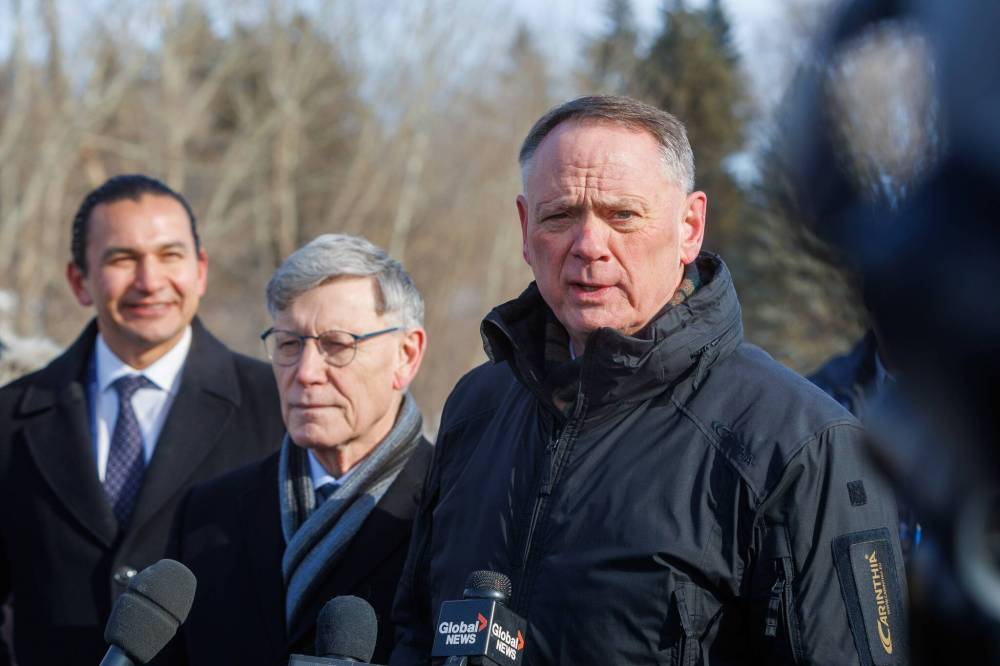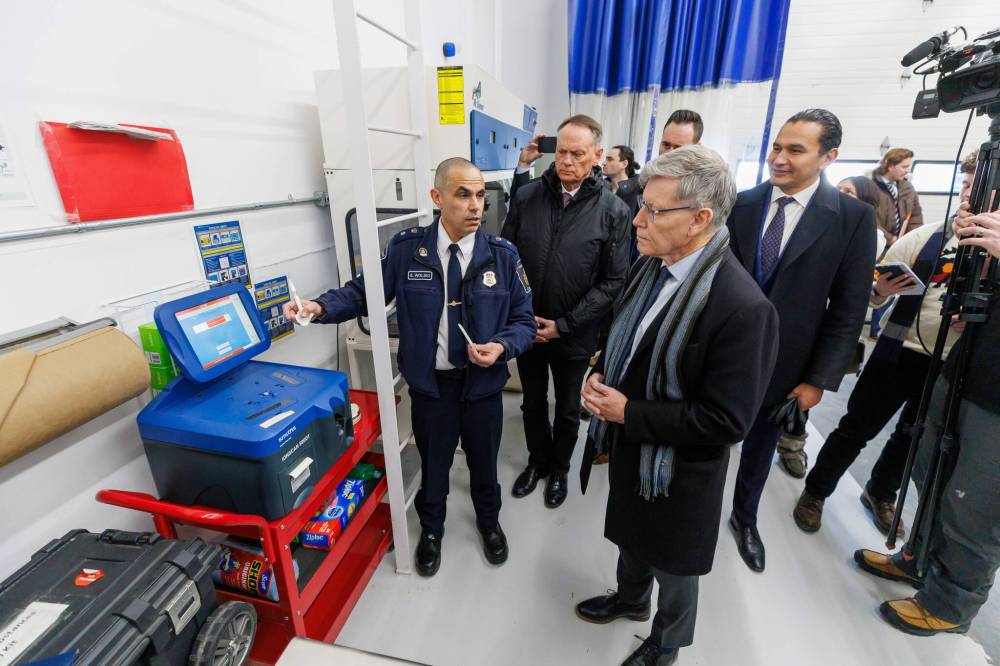EMERSON — Federal Public Safety Minister David McGuinty and Premier Wab Kinew used the Canada-U.S. border as a backdrop Tuesday to tout the creation of a “fentanyl czar,” who will work with the U.S. to curb drug trafficking.
The two leaders were in Emerson to sell the new position as a way to boost border safety, one day after U.S. President Donald Trump postponed 25 per cent tariffs on Canadian goods, for at least a month.
“The interpretation of today is Canadians should know we have a very strong border, and we’re making it stronger,” McGuinty said.
“Canadians should know we’re co-operating between different orders of government. Canadians should know that their efforts to stand up for Canada are not in vain.”

MIKE DEAL / FREE PRESS
Federal Public Safety Minister David McGuinty (left), with Premier Wab Kinew (right) and Terry Duguid, the federal cabinet minister for Prairies Economic Development Canada, talks to the media after meeting with law enforcement officers.
McGuinty, Kinew and Terry Duguid, the federal cabinet minister for Prairies Economic Development Canada, spoke to members of law enforcement agencies at the event, including the Canadian Border Services Agency, RCMP, Manitoba Conversation and Manitoba First Nations Police Service. A federal border officer demonstrated the use of a machine that detects dozens of items, including drugs and explosives.
While Kinew didn’t speak to media at the show-and-tell, he did talk about the issue at a news conference later in the day.
The premier, who has spoken about “Trump-proofing” the economy, said it’s his responsibility to keep Manitobans safe.
“I don’t know anyone out there that would say Donald Trump and I are two peas in a pod, but if we share an interest in cracking down on drug trafficking in our respective jurisdictions, then I think we both pursue that at the same time.”
The event was supposed to include a demonstration of one of Canada’s new Black Hawk border patrol units, but that was cancelled at the last minute without explanation. Canada has invested $1.3-billion for border security in response to Trump’s rhetoric about cross-border drug trafficking.
Despite the hiccup, McGuinty said the event was not just to send a message to Trump.
“This is what this day is about — reminding each other, in a Team Canada approach, we can do this, we will do this, and that’s why we are here looking at the investments and how well they are working for us now.”

MIKE DEAL / FREE PRESS
CBSA chief of operations Steven Wolski (left) demonstrates the use of a fentanyl detection device during a tour of the border security service in Emerson.
The new “fentanyl czar” position, which is currently vacant, is part of Canada’s new spending to bolster border protection. McGuinty said more information will be released this week.
The federal minister, who denied the czar role was an American idea, said the fentanyl crisis affects many parts of society.
The czar will pull together federal and local law enforcement agencies, global affairs officials, the attorney general, provincial counterparts and Health Canada, with the latter tracking and tracing the source of precursors used to create fentanyl abroad.
The minister said that less than one per cent of fentanyl in the U.S. has come from Canada.
“In a 12-month period last year, 43 pounds of fentanyl was apprehended by American authorities crossing into the United States from Canada,” McGuinty said.
In the same period, 23,000 pounds arrived in the U.S. from Mexico.
“There’s a lot at stake here… We have a choice to make between two countries. We can win-win or we can lose-lose. We think it’s better to win-win.”–Federal Public Safety Minister David McGuinty
McGuinty said the federal government is convinced these latest efforts will help manage relations with the Americans even as the tariff threat continues.
“There’s a lot at stake here,” he said. “This isn’t naive. This is real. This is the largest economic relationship in the world. We have a choice to make between two countries. We can win-win or we can lose-lose. We think it’s better to win-win.”
Christopher Adams, adjunct professor of political studies at the University of Manitoba, said Tuesday’s event was partly for Trump’s benefit, but mostly for Canadians.
“I would say that much of what our politicians are doing is, in part, to show the president of the United States that we’re doing things he’s asked us to, but also that these demonstrations… demonstrate to the population of Canada and Manitobans that something is being done,” Adams said.
Adams, who returned from Washington D.C. on Monday, said Americans know how disruptive the tariff threat has been to the American economy, let alone Canada.
“Up in Canada, we’ve seen tariffs as the No. 1 issue, but in the United States, there are other issues that are bubbling up, not just regarding tariffs, including the treatment of migrants, which is having a real impact on different parts of American society,” he said.
Adams said Canada is a victim of a drive-by shooting of sorts.
“Mexico is really what he’s targeting for migrants and fentanyl, and we just happen to be caught in the crossfire on this,” he said, adding that being a part of the Canada-United States-Mexico Agreement also draws the country in.
“Clearly, Trump is sabre-rattling and, as evidenced by today’s event at the border, we’re responding to it,” he said.
scott.billeck@freepress.mb.ca

Scott Billeck
Reporter
Scott Billeck is a general assignment reporter for the Free Press. A Creative Communications graduate from Red River College, Scott has more than a decade’s worth of experience covering hockey, football and global pandemics. He joined the Free Press in 2024. Read more about Scott.
Every piece of reporting Scott produces is reviewed by an editing team before it is posted online or published in print — part of the Free Press‘s tradition, since 1872, of producing reliable independent journalism. Read more about Free Press’s history and mandate, and learn how our newsroom operates.
Our newsroom depends on a growing audience of readers to power our journalism. If you are not a paid reader, please consider becoming a subscriber.
Our newsroom depends on its audience of readers to power our journalism. Thank you for your support.